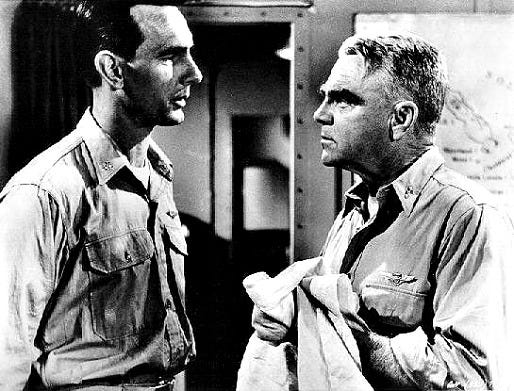The Gallant Hours (1960)

"The Gallant Hours" is a war movie with no depiction of war. Other than a few faraway sounds of cannon fire or pinging submarine sonar, there is nothing in the film that even alludes to combat. Rather, the action takes place in cramped shipboard offices, inside jungle tents or the back of a Jeep. It's not about the bond that forms between foot soldiers during a war but the loneliness of command of the admirals and generals sending them into the fray.
"Gallant" is a biopic of Admiral William F. "Bull" Halsey, but rather than attempting a sprawling narrative of his entire life, it focuses entirely on the five-week period leading up to the naval battle of Guadalcanal, a key turning point in World War II. Halsey made some bold decisions to take the fight to the Japanese despite having an inferior fleet, and the movie depicts these choices as making the difference in the Pacific campaign.
It's unabashed hagiography, but done well and with a minimum of historical chicanery.
James Cagney, outfitted with some caterpillar eyebrows, zestfully tackles the role of the larger-than-life Halsey. If anything, they tone him down quite a bit, since Halsey was known for his salty language and quicksilver temperament. This was one of Cagney's final starring roles, and he made the most of it.
Director Frank Montgomery made his own bold choice in how the story would play out. He alternates between scenes of the American and Japanese commanders conferring and planning (though obviously more time is spent on the Yanks). It would seem to be rather dull stuff — pulling papers out of attache cases, pointing at maps, etc. But Montgomery makes it engaging and often even compelling.
Usually in war movies, the focus is on the "man-on-the-ground" perspective, amid the mud and blood, often with dismissive references to the generals issuing deadly orders while safely ensconced in the rear. "Gallant" shows that, even if the fellows with all the brass weighing down their collars have much cushier accommodations, the burden they bear can be crushing.
Montgomery and his screenwriters (Bernie Lay Jr. and Frank D. Gilroy) make the interesting choice to provide a lot of narration (by Montgomery himself) about what we're seeing and about virtually every individual we encounter. So when we first meet a character — even one who might disappear in a couple of minutes — there will be some newsreel-ish exposition saying who he is, where he came from, his personality and combat experience, etc. Sometimes it will even reveal that he will die later in the war.
Again, this has the potential to become repetitive and even comical if overdone ("Arthur Jones, ship's cook, from Baton Rougie, a miller's son, quick with a smile and quicker with a spatula ..."). But somehow the tactic works, and we feel like we're getting a more complete picture of the men surrounding Halsey.
Only two really stand out as personalities. Harry Black (Ward Costello) is the by-the-book man who's initially affronted by Halsey's seat-of-his-pants style of command, but ends up fiercely loyal. Dennis Weaver plays Andy Lowe, a pilot from the South with a thing for the ladies. His laconic, slightly mocking manner and molasses-slow line delivery act to lighten things up whenever it gets too intense.
"The Gallant Hours" is also notable for its remarkably evenhanded depiction of the Japanese commanders, who are shown as honorable, diligent and resolute. Perhaps by the time this film came out, a decade and a half after the war's end, audiences were ready to accept a portrayal of their former enemies in a way that was not singlemindedly jingoistic.
Overall, the historical accuracy of the film is pretty scrupulous, with one glaring exception — the interception and destruction of the aircraft carrying Admiral Yamamoto, the revered Japanese naval commander. "Gallant" shows this happening extemporaneously with the big final battle, suggesting it was a ballsy call by Halsey that allowed him to take out his counterpart.
In fact, Yamamoto's death occurred months later and, according to Yamamoto's Wikipedia page, Halsey was consulted on the operation to dispatch the plane, but did not conceive of the plan.
I can see why the filmmakers inserted this bit of flimflam. The back-and-forth nature of the opposing commanders' schemes plays out like something of a chess match — which, the film reminds us several times, was a personal passion of Yamamoto. Including his death acts as the knocking over of the king piece, the final victory in their battle of wits.
4 Yaps



